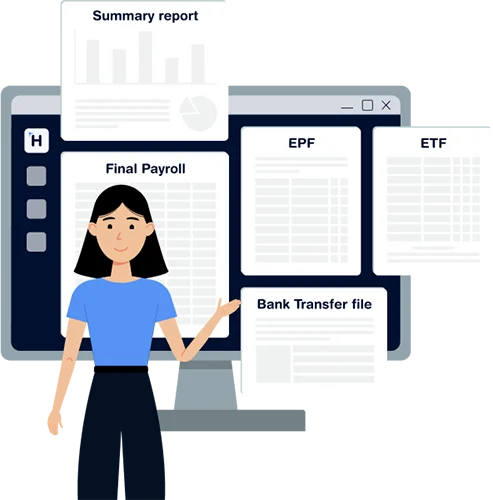Statutory Payments Are Key for Small Businesses To Run Payroll Smoothly and Remain Compliant
For example, when considering income tax, with the Inland Revenue (Amendment) Act, No 10. of 2021 (amending the Inland Revenue Act, No. 24 of 2017) bringing in new exemptions and tax regulation changes, plus the introduction of APIT in place of the former PAYE tax system, small businesses are now left without adequate knowledge of the different statutory compliance and payment requirements they are responsible for.
Also, statutory payments are a vital part of the local payroll process and feature significantly in both employer and employee liability payments and are among the most significant payroll deductions when calculating staff salary payments.
Generally, Employee Provident Fund (EPF) and Employee Trust Fund (ETF) are the main payments included in the monthly payroll, while Gratuity payments, APIT tax, and Stamp Duty may or may not be a part of each month’s payroll.
Non-Compliance, Late Payments and Incorrectly Filling Statutory Payment Details Can Lead to Fines
Statutory Compliance and Payment Benefits for Employees
- EPF 30% pre-benefits will be paid for housing loan schemes and medical treatments for employees.
- EPF members can claim retirement benefits such as contributions and accumulated interest when reaching the retirement age, 50 years for females and 55 years for males.
- Female EPF members can claim benefits even when they retire due to marriage. This can be made if she marries within 3 months of retiring from the job or leaving her job within 5 years of marriage.
- Members of EPF can claim benefits when migrating to another country on a permanent visa.
- Medical benefits are awarded to employees who are members of regulatory payment schemes such as EPF and ETF.
- Rs.15,000 is provided annually as a financial reward to 9000 children of ETF members for good results from the Grade 5 scholarship exam. In addition, Rs.12,000 is awarded to 5000 children of active ETF members for passing the Advanced level examination with excellent results.
- Old age and disability benefits are provided to ETF employees.
- In terms of statutory benefits for ETF, members do not have to wait till they attain a certain age to withdraw their ETF fund balance. However, for this purpose, leaving employment is mandatory to make a withdrawal claim, and the reason for leaving the job should be retirement, resignation, dismissal or vacation of post etc. Also, a member cannot make a second withdrawal claim for the next 5 years once the withdrawal balance is made.
Now that we’ve explored numerous employee benefits involving statutory payments and compliance, we move to the central part of this article to discuss five of the main statutory payments which Sri Lankan small businesses need to be aware of and integrate into their payroll process.
1. Employee Provident Fund (EPF)
The EPF was established under the EPF Act No. 15 of 1958 as a mandatory scheme for the private and semi-government sector employees who do not have the privilege of enjoying pension benefits as commonly seen in the government sector. EPF is presently the largest and most extensively applied social security scheme in Sri Lanka.
Both the employer and employee contribute to EPF, where the employer has to contribute 12% and the employee should contribute 8% respectively of the total earning of the employee’s monthly salary.
How is EPF regulated?
Administration of EPF is regulated by the Department of Labour while the Monetary Board regulates the management of funds through the Central Bank EPF department. It’s important to note that an employee’s EPF balance keeps increasing as they grow in their career and gain years of experience.
When calculating EPF, the following pay items need to be taken into consideration:
- Salary, wages or fees
Cost of living allowances, special living allowances and similar allowances. - Holiday payments.
- The cash value of cooked or uncooked food supplied by the employer to the employee.
- Food allowance.
- Any remuneration that can be specified.
- Commissions, piece-rate payments and contract basis payments.
It must be remembered that the EPF liable pay items will differ from company to company, based on the salary structure they have set.
The following are generally not considered when calculating EPF:
- Overtime.
- Reimbursable travelling allowance.
- Incentives/ Bonus.
How is EPF regulated?
For late EPF payments, the following surcharge rates will be applied based on the number of days delayed:
- 01 day – 10 days = 5%
- 11 days – 01 month = 15%
- 01 month – 03 months = 20%
- 03 months – 6 months = 30%
- 06 months – 12 months = 40%
- More than 12 months = 50%
2. Employee Trust Fund (ETF)
Under the ETF Act No. 46 of 1980, it’s only the employer that contributes to ETF and it amounts to 3% of an employee’s total earnings. The ETF is regulated under the ETF Board and it’s presently under the supervision of the Sri Lankan Prime Minister, Mahinda Rajapaksa.
When calculating ETF, the following pay items need to be taken into consideration:
- Salary.
- Cost of living allowance.
- Payment in respect of holidays.
- Meal allowance.
- Any other types of remuneration.
However, the following are generally not considered when calculating ETF:
- Incentives, attendance, productivity and night allowance.
- Overtime.
- Bonus.
- Service charges.
- Supervising allowance.
- Acting allowance.
- Professional allowance.
- Festival allowance.
- Housing allowance.
- Travel allowance.
- On-call allowance.
Applicable ETF Penalties
It is important to note that if the employer delays making ETF payments as per the legal timeframe indicated, then the employer is liable to pay a surcharge fee.
If you pay an amount lesser than what you’re entitled to pay as your ETF contribution, a penalty will be imposed based on the number of days, starting from the day of underpayment. However, the percentage of penalty differs according to the number of days that’s been delayed to make the full payment:
- 10 days = 5%
- 11 days – 01 month = 15%
- 01 month – 03 months = 20%
- 03 months – 06 months = 30%
- 06 months – 12 months = 40%
- More than 12 months = 50%
3. Gratuity payments
Gratuity payment is a social security scheme for private sector employees just like EPF and ETF, which is governed under The Payment of Gratuity Act No.12 of 1983. As an employer, you are required to pay an amount as gratuity for employees who have worked for 5 years or more before they are terminated from their service, within 30 days. This is done by calculating against the employee’s previous month’s salary.
Part ii of The Payment of Gratuity Act No. 12 of 1983 requires every employer who has 15 or more employees on any day during a period of 1 year, to pay gratuity.
Applicable Penalties for Gratuity payments
Following penalties will be imposed under s 15(1) of The Payment of Gratuity Act No. 12 of 1981 for violating any provisions of the Act including defaulting Gratuity payment:
- A fine not exceeding Rs. 500 shall be imposed on the order of the Magistrate Court.
- A person can be imprisoned for not more than 6 months.
- An individual can be subject to both fines and imprisonment.
4. Advance Personal Income Tax (APIT)
Recently, the Sri Lankan government replaced the Pay as You Earn tax (PAYE) with a new tax policy known as the Advance Personal Income Tax or APIT tax.
With APIT, the employer can deduct taxes from employees who are Sri Lankan citizens and from foreign employees residing in Sri Lanka with their permission. However, the employer doesn’t need permission to deduct this tax from Sri Lankan employees residing abroad. That being said, employees who are earning an annual income of Rs. 3,000,000 are bound to pay APIT tax.
It’s important to note that employees might be taxable if they fall into the 7 different tax tables under this tax which you can refer in the Sri Lanka Inland Revenue site, included below.
Applicable APIT Penalties
For failure to deduct APIT from your employees’ income, the below penalties will be applied:
- A penalty equal to 20% of the due tax will be applied if the whole or part of the tax is not paid or remitted within 14 days of the due date.
- An interest equal to 1.5% monthly or part of the month on the tax amount will be applied if the tax is not settled within the due date.
5. Stamp Duty
The Inland Revenue Department of Sri Lanka collects another type of tax referred to as Stamp Duty. Stamp Duty is governed under No. 43 of Stamp Duty Act 1982. In order to compound Stamp Duty, any employer who has more than 100 employees who accepts receipts for making salary payments to employees should obtain registration from the Department of Inland Revenue.
According to s 13(1)(d) of Stamp Duty Act 1982, the Commissioner-general may “authorize any employer making payments to employees who are liable to give stamped receipts in respect of such payments.”
It should be noted that, out of the 9 different tax instruments, the ninth instrument provides that a receipt or discharge given for any money or other property with a value exceeding 25,000 rupees is taxed at a flat rate of 25 rupees. Accordingly, if you’re paying an employee a monthly salary of Rs. 25,000, there will be a flat rate of Rs. 25 tax applicable to you as stamp duty.
Applicable Stamp Duty Penalties
Based on s 44 of Stamp Duty Act 1982, an individual will be subject to penalties, fees, fines or costs if:
- The duty payable each quarter under s 13 of Stamp Duty Act 1982 is not paid on or before the specified date; the duty, along with a penalty equal to 10% of the duty for every month of non-payment will be the amount that has been defaulted for which the defaulter (employer) has to pay.
The 5 statutory payment items we’ve explored above are critical for small businesses in maintaining statutory and regulatory compliance in Sri Lanka and are crucial to effectively and compliantly run payroll in Sri Lanka. Equally, statutory payment compliance will ensure small businesses dutifully address employee welfare long-term while avoiding costly fines and reputation damage.
The 5 statutory payment items we’ve explored above are of critical importance for small businesses in maintaining statutory and regulatory compliance in Sri Lanka, and are critical to effectively and compliantly run payroll in Sri Lanka. Equally, statutory payment compliance will ensure small businesses dutifully address employee welfare long-term while avoiding costly fines and reputation damage.
Now that we’ve discovered why it is vital for small businesses to be familiar with these statutory payments and the contexts in which they apply, you can proceed to integrate them into your in-house payroll process or consider outsourcing your payroll requirement to a Chartered Accountancy firm with statutory payment and compliance specialists.
Resource links:
http://www.ird.gov.lk/en/publications/sitepages/apit_tax_tables.aspx?menuid=1503
http://www.ird.gov.lk/en/publications/SitePages/Tax_Chart_2021.aspx?menuid=1404
https://www.social-protection.org
https://etfb.lk/statutory-benefits/
https://etfb.lk/non-statutory-benefits/
https://uk.practicallaw.thomsonreuters.com
https://etfb.lk/welcome
https://salary.lk/labour-law/social-security/social-security-and-pensions-1
https://etfb.lk/payment-of-contributions/
https://salary.lk/labour-law/social-security/social-security-and-pensions-1
http://www.labourdept.gov.lk/images/PDF_upload/Chapter05/8_payment_of_gratuty.pdf
http://www.ird.gov.lk/en/Type%20of%20Taxes/SitePages/StampDuty.aspx?menuid=1213
http://www.ird.gov.lk/en/Type%20of%20Taxes/Stamp%20Duty_Acts/SDActNo.12[E]2006ConsolFinal.pdf



